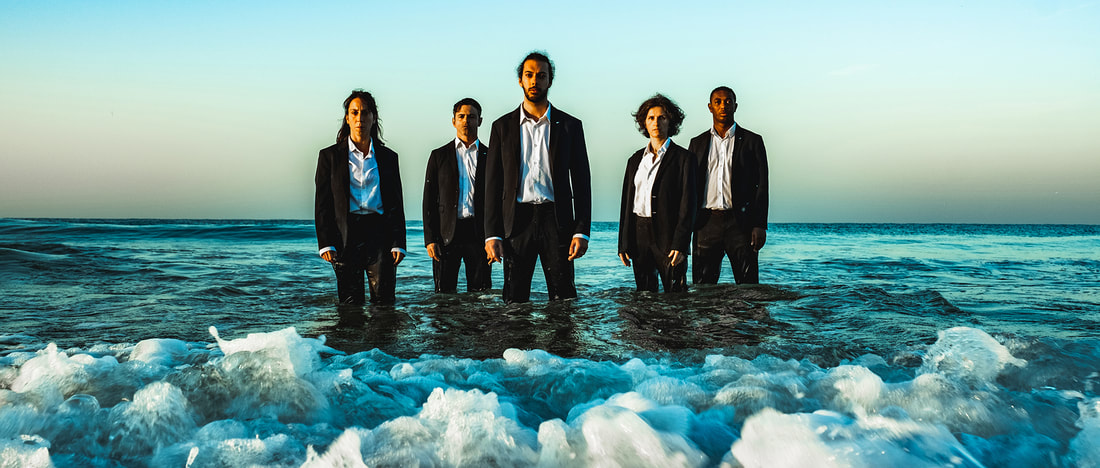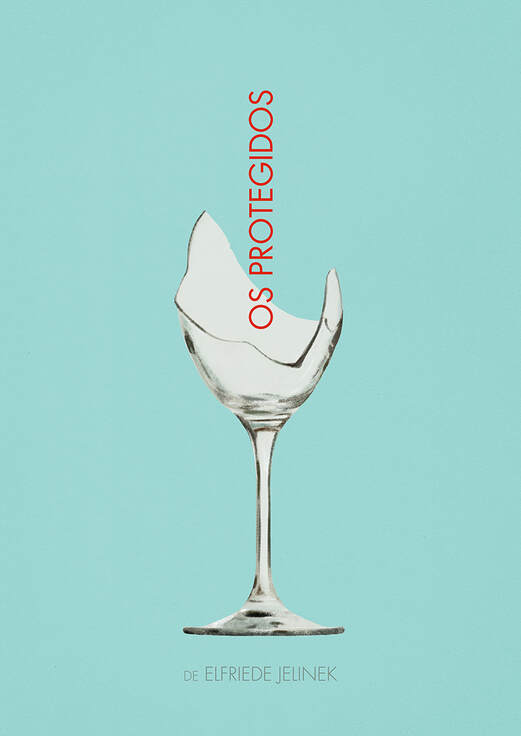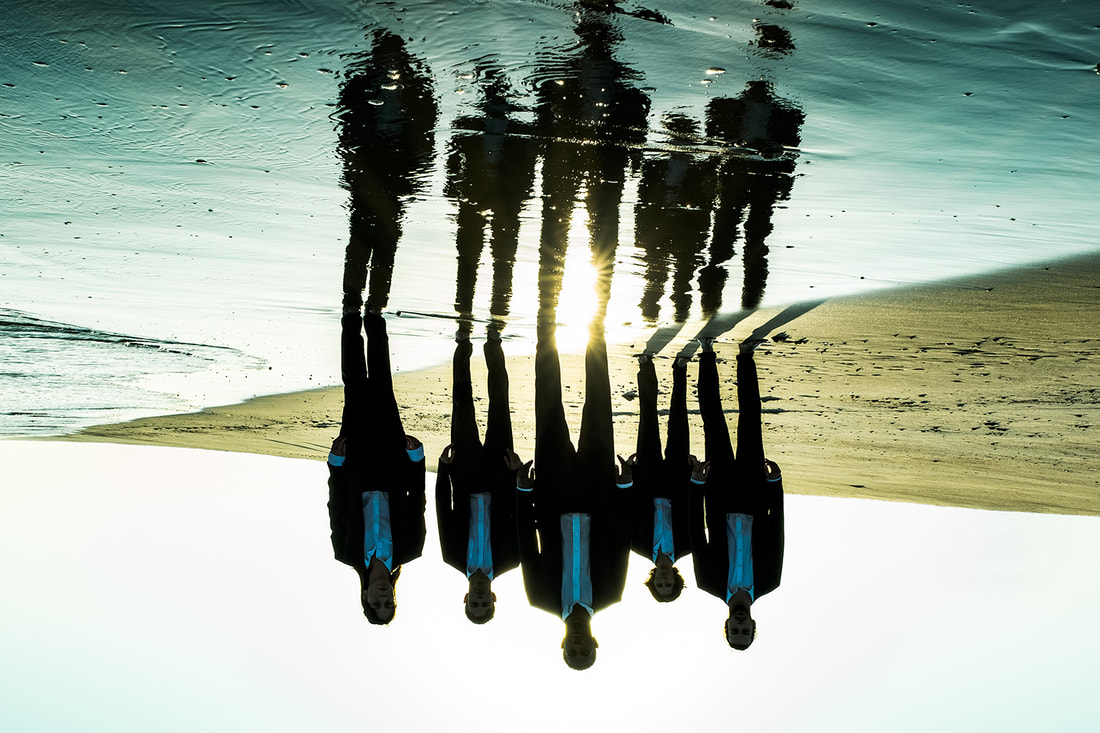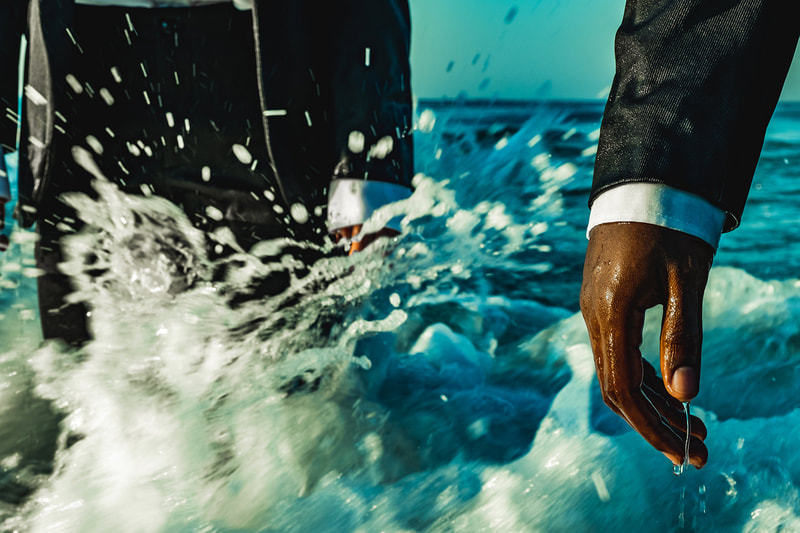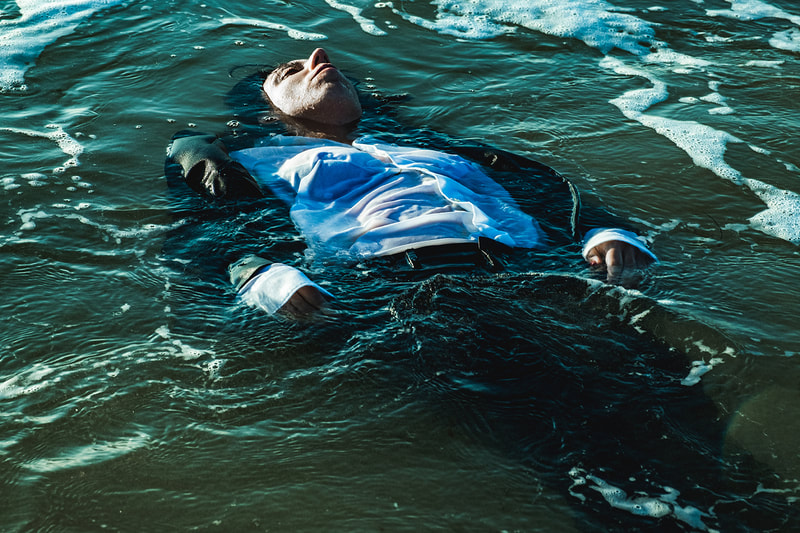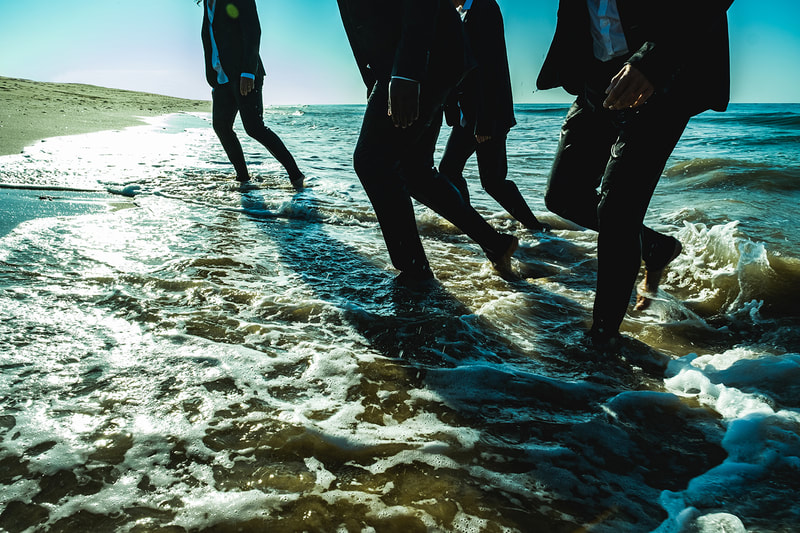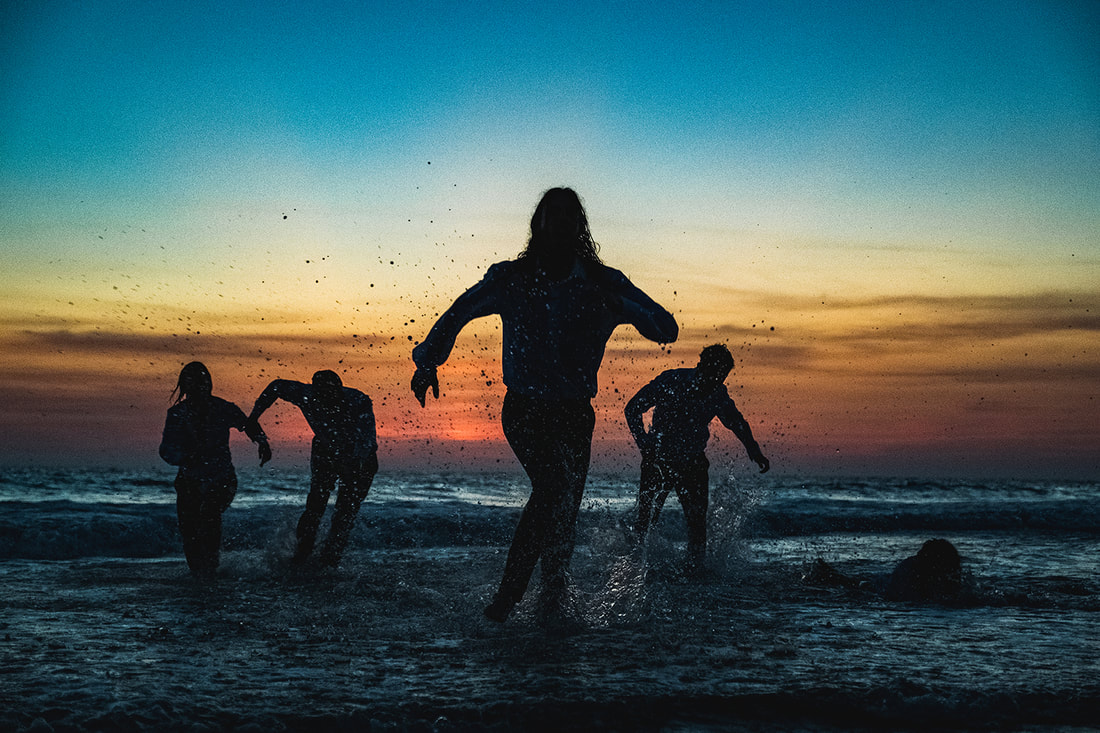OS PROTEGIDOS
coprodução teatromosca, Colectivo Glovo, Teatro Diogo Bernardes, Teatro Nacional S. João e Theatro Circo
coprodução teatromosca, Colectivo Glovo, Teatro Diogo Bernardes, Teatro Nacional S. João e Theatro Circo
(c) Catarina Lobo
título original Die Schutzbefohlenen
de Elfriede Jelinek
tradução e dramaturgia de Anabela Mendes
direção artística de Pedro Alves
banda sonora original de Maria da Rocha
de Elfriede Jelinek
tradução e dramaturgia de Anabela Mendes
direção artística de Pedro Alves
banda sonora original de Maria da Rocha
ANTESTREIA 11 NOVEMBRO 2023
no Auditorio Municipal Gustavo Freire, Lugo, Galiza
no Auditorio Municipal Gustavo Freire, Lugo, Galiza
ESTREOU 23 NOVEMBRO 2023, às 21h
no AMAS - Auditório Municipal António Silva
no AMAS - Auditório Municipal António Silva
transmissão em direto e em simultâneo no palco virtual do teatromosca na BOL a 25 novembro
[O ESPETÁCULO]
"Os Protegidos", texto inédito de Elfriede Jelinek, baseado num acontecimento real - a presença em território austríaco, no final de 2012, de cerca de 100 refugiados de várias nacionalidades e em busca de asilo -, trata do modo displicente, cobarde e inadmissível como o Estado austríaco entendeu tratar esta trágica ocorrência, e o imediato e simultâneo enfurecimento de grupos de extrema-direita a propósito da presença em Viena desse conjunto de estrangeiros. O texto tem vindo a ser revisto pela autora, procurando, de certo modo, expandir o assunto da peça em direção a outros tempos da História da Humanidade, criando novas possibilidades de articulação com a matéria atual. O carácter reflexivo de todo o conjunto parece sustentar a ideia de que a humanidade pouco ou nada muda e não aprende com os seus próprios erros. Essencialmente a autora produz exposição de processos corruptores de que se servem os poderosos a nível mundial, fazendo uso da sua influência junto de outros, e a fim de alcançarem benefícios que de outro modo não teriam.
O espetáculo parte deste texto da aclamada autora austríaca, com tradução assinada por Anabela Mendes, que assume, igualmente, o papel de dramaturgista neste projeto, com encenação de Pedro Alves e banda sonora original, interpretada ao vivo, pela violinista Maria da Rocha. O trabalho assentará tanto sobre a linguagem e a desconstrução das convenções do drama (a unidade de tempo, lugar, ação, a fábula, as personagens, o diálogo etc.), criando invés uma espécie de orquestração de vozes, privilegiando ritmos e jogos de sonoridade musical e em que a linguagem entra em cena como “superfície de texto”, seguindo algumas das noções do teatro pós-dramático de Lehmann, como refletirá sobre a heteroglossia proposta por Mikhail Bakhtin, a definição de chora para Julia Kristeva ou a teoria da presença defendida por Hans Ulrich Gumbrecht, expondo, de modo muito claro, um conjunto de questões políticas fraturantes que ensombra as sociedades contemporâneas.
Consulte aqui a folha de sala do espetáculo.
O espetáculo parte deste texto da aclamada autora austríaca, com tradução assinada por Anabela Mendes, que assume, igualmente, o papel de dramaturgista neste projeto, com encenação de Pedro Alves e banda sonora original, interpretada ao vivo, pela violinista Maria da Rocha. O trabalho assentará tanto sobre a linguagem e a desconstrução das convenções do drama (a unidade de tempo, lugar, ação, a fábula, as personagens, o diálogo etc.), criando invés uma espécie de orquestração de vozes, privilegiando ritmos e jogos de sonoridade musical e em que a linguagem entra em cena como “superfície de texto”, seguindo algumas das noções do teatro pós-dramático de Lehmann, como refletirá sobre a heteroglossia proposta por Mikhail Bakhtin, a definição de chora para Julia Kristeva ou a teoria da presença defendida por Hans Ulrich Gumbrecht, expondo, de modo muito claro, um conjunto de questões políticas fraturantes que ensombra as sociedades contemporâneas.
Consulte aqui a folha de sala do espetáculo.
About the performance
“Os Protegidos”, an unpublished text in Portugal, by Elfriede Jelinek, is based on a real event — the presence in Austrian territory, in late 2012, of about 100 refugees of various nationalities and in search of asylum. The text deals with the negligent, cowardly and inadmissible way in which the Austrian State chose to treat this tragic occurrence, and the immediate and simultaneous rage of extreme right-wing groups regarding the presence in Vienna of this group of foreigners. The text has been revised by the author, trying, in a way, to expand the subject matter of the play towards other times in the History of Humanity, creating new possibilities of articulation with the present matter. The reflective character of the whole seems to support the idea that humanity changes little or not at all and does not learn from its own mistakes. Essentially, the author exposes the corrupting processes used by the world's powerful in order to use their influence on others to achieve benefits they would not otherwise have.
The performance is based on the text "Charges (The Supplicants)" (English translation) by the acclaimed Austrian author, translated by Anabela Mendes, who also takes on the role of dramaturgist in this project, directed by Pedro Alves and original music, performed live by violinist Maria da Rocha. The work is based both on language and on the deconstruction of the conventions of drama (the unity of time, place, action, the fable, the characters, the dialogue, etc.), creating instead a kind of orchestration of voices, privileging rhythms and musical sonority games and in which language enters the scene as a “text surface”, following some notions of Lehmann's post-dramatic theatre, as well as reflecting on the diversity of points of view or discursive styles in the same language, text, or utterance proposed by Mikhail Bakhtin, Julia Kristeva's definition of the word “chora” or the theory of presence defended by Hans Ulrich Gumbrecht, exposing, in a very clear way, a set of fracturing political issues that overshadow contemporary societies.
“Os Protegidos”, an unpublished text in Portugal, by Elfriede Jelinek, is based on a real event — the presence in Austrian territory, in late 2012, of about 100 refugees of various nationalities and in search of asylum. The text deals with the negligent, cowardly and inadmissible way in which the Austrian State chose to treat this tragic occurrence, and the immediate and simultaneous rage of extreme right-wing groups regarding the presence in Vienna of this group of foreigners. The text has been revised by the author, trying, in a way, to expand the subject matter of the play towards other times in the History of Humanity, creating new possibilities of articulation with the present matter. The reflective character of the whole seems to support the idea that humanity changes little or not at all and does not learn from its own mistakes. Essentially, the author exposes the corrupting processes used by the world's powerful in order to use their influence on others to achieve benefits they would not otherwise have.
The performance is based on the text "Charges (The Supplicants)" (English translation) by the acclaimed Austrian author, translated by Anabela Mendes, who also takes on the role of dramaturgist in this project, directed by Pedro Alves and original music, performed live by violinist Maria da Rocha. The work is based both on language and on the deconstruction of the conventions of drama (the unity of time, place, action, the fable, the characters, the dialogue, etc.), creating instead a kind of orchestration of voices, privileging rhythms and musical sonority games and in which language enters the scene as a “text surface”, following some notions of Lehmann's post-dramatic theatre, as well as reflecting on the diversity of points of view or discursive styles in the same language, text, or utterance proposed by Mikhail Bakhtin, Julia Kristeva's definition of the word “chora” or the theory of presence defended by Hans Ulrich Gumbrecht, exposing, in a very clear way, a set of fracturing political issues that overshadow contemporary societies.
(c) Catarina Lobo
[A ESCRITORA]
Elfriede Jelinek nasceu em 1946, em Mürzzuschlag na Aústria. Em 2004, recebeu o Prémio Nobel da Literatura. Estudou música no Conservatório, teatro e história da arte na Universidade de Viena. A sua extensa obra incluiu romances, peças de teatro, poesia e ensaios. O seu trabalho é caracterizado como genial e controverso. Usa a linguagem como interação estrutural na abordagem de temas como a cultura pop, a opressão do género, a sexualidade feminina, a exploração económica, os nacionalismos, numa tradição de outros escritores austríacos como Karl Kraus ou Thomas Bernhardt. O seu livro A Pianista foi adaptado para o cinema, por Michael Haneke, tendo como protagonista a atriz Isabelle Huppert. O seu site na internet é um repositório impressionante da sua obra, sempre em expansão. Em 2022 escreveu “Ukraine”, uma carta aos russos.
The writer
Elfriede Jelinek was born in 1946 in Mürzzuschlag in Austria. In 2004, she received the Nobel Prize for Literature. She studied music at the Conservatory, theatre, and art history at the University of Vienna. Her extensive work included novels, plays, poetry, and essays. Her work is characterized as brilliant and controversial. She uses language as a structural interaction in addressing themes such as pop culture, gender oppression, female sexuality, economic exploitation, nationalisms, in a tradition of other Austrian writers such as Karl Kraus or Thomas Bernhardt. Her book The Piano Teacher was adapted into a film by Michael Haneke, starring the actress, Isabelle Huppert. Her website is an impressive repository of her work. In 2022, she wrote “Ukraine”, a letter to the Russians.
Elfriede Jelinek was born in 1946 in Mürzzuschlag in Austria. In 2004, she received the Nobel Prize for Literature. She studied music at the Conservatory, theatre, and art history at the University of Vienna. Her extensive work included novels, plays, poetry, and essays. Her work is characterized as brilliant and controversial. She uses language as a structural interaction in addressing themes such as pop culture, gender oppression, female sexuality, economic exploitation, nationalisms, in a tradition of other Austrian writers such as Karl Kraus or Thomas Bernhardt. Her book The Piano Teacher was adapted into a film by Michael Haneke, starring the actress, Isabelle Huppert. Her website is an impressive repository of her work. In 2022, she wrote “Ukraine”, a letter to the Russians.
[O ENCENADOR]
Pedro Alves nasceu em Sintra, em 1979. Cofundador e diretor artístico do teatromosca, onde tem desempenhado funções de ator, encenador e produtor. Licenciado em Estudos Artísticos, na variante de artes do espetáculo, e Mestre em Estudos de Teatro pela Faculdade de Letras da Universidade de Lisboa. Frequentou ações de formação na área da gestão cultural, produção, encenação, gestão de projetos e recursos humanos e animação sociocultural, entre outras. Frequentou cursos de formação de atores dirigidos por João de Mello Alvim, João Miguel Rodrigues e Adolfo Simón. Como ator, participou em espetáculos com textos de Eric Bogosian, Eça Leal, Sófocles, Stig Dagerman, Lorca, Fernando Sousa, Jean Genet, Oscar Wilde, entre outros, dirigido por Nuno Pinto, Antonino Solmer, Filomena Oliveira, João de Mello Alvim, Mário Trigo, Rui Mário, Paulo Campos dos Reis, João Miguel Rodrigues e Adolfo Simón, na Companhia de Teatro de Sintra, Dante - Compañia de Teatro de Madrid, Teatro TapaFuros, teatromosca, Teatro Focus etc. Trabalhou com as coreógrafas Carla Sampaio, Daniel Cardoso e Célia Alturas. Desempenhou funções de formador e encenador do Grupo de Teatro da Faculdade de Farmácia de Lisboa. Colaborou com o Quorum Ballet em diversos espetáculos na função de dramaturgista e na direção artística. No teatromosca, dirigiu, entre outros, os espetáculos “Dog Art”, “Kip”, “As Três Vidas de Lucie Cabrol”, “Europa”, “Tróia”, “Moby-Dick”, “O Som e a Fúria”, “Fahrenheit 451”, “Kif-Kif” e o projeto “MODOS DE VER”. Em 2021 escreveu e encenou o espetáculo “Maridos” a partir do filme “Husbands” de John Cassavetes.
The director
Pedro Alves was born in Sintra, in 1979. Co-founder and artistic director of teatromosca, where he has worked as an actor, director, and producer. He has a degree in Theatre Studies, and a Master in Theatre Studies from the School of Arts and Humanities from Universidade de Lisboa. He has attended training courses in the areas of cultural management, production, directing, project management and human resources and socio-cultural activities, among others. He attended training courses for actors directed by João de Mello Alvim, João Miguel Rodrigues and Adolfo Simón. As an actor, he participated in shows with texts by Eric Bogosian, Eça Leal, Sófocles, Stig Dagerman, Lorca, Fernando Sousa, Jean Genet, Oscar Wilde, among others, directed by Nuno Pinto, Antonino Solmer, Filomena Oliveira, João de Mello Alvim, Mário Trigo, Rui Mário, Paulo Campos dos Reis, João Miguel Rodrigues and Adolfo Simón, in the Teatro de Sintra Company, Dante - Compañia de Teatro de Madrid, Teatro TapaFuros, teatromosca, Teatro Focus etc. He worked with the choreographers Carla Sampaio, Daniel Cardoso and Célia Alturas. He worked as trainer and director of the Theatre Group of the Faculty of Pharmacy of Universidade de Lisboa. He collaborated with Quorum Ballet in several shows as dramaturgist and artistic director. At teatromosca he directed, among others, “Dog Art”, “Kip”, “As Três Vidas de Lucie Cabrol”, “Europa”, “Tróia”, “Moby-Dick”, “O Som e a Fúria”, “Fahrenheit 451”, “Kif-Kif” and the project “MODOS DE VER”. In 2021, he wrote and directed the show “Maridos” from the film “Husbands” by John Cassavetes.
Pedro Alves was born in Sintra, in 1979. Co-founder and artistic director of teatromosca, where he has worked as an actor, director, and producer. He has a degree in Theatre Studies, and a Master in Theatre Studies from the School of Arts and Humanities from Universidade de Lisboa. He has attended training courses in the areas of cultural management, production, directing, project management and human resources and socio-cultural activities, among others. He attended training courses for actors directed by João de Mello Alvim, João Miguel Rodrigues and Adolfo Simón. As an actor, he participated in shows with texts by Eric Bogosian, Eça Leal, Sófocles, Stig Dagerman, Lorca, Fernando Sousa, Jean Genet, Oscar Wilde, among others, directed by Nuno Pinto, Antonino Solmer, Filomena Oliveira, João de Mello Alvim, Mário Trigo, Rui Mário, Paulo Campos dos Reis, João Miguel Rodrigues and Adolfo Simón, in the Teatro de Sintra Company, Dante - Compañia de Teatro de Madrid, Teatro TapaFuros, teatromosca, Teatro Focus etc. He worked with the choreographers Carla Sampaio, Daniel Cardoso and Célia Alturas. He worked as trainer and director of the Theatre Group of the Faculty of Pharmacy of Universidade de Lisboa. He collaborated with Quorum Ballet in several shows as dramaturgist and artistic director. At teatromosca he directed, among others, “Dog Art”, “Kip”, “As Três Vidas de Lucie Cabrol”, “Europa”, “Tróia”, “Moby-Dick”, “O Som e a Fúria”, “Fahrenheit 451”, “Kif-Kif” and the project “MODOS DE VER”. In 2021, he wrote and directed the show “Maridos” from the film “Husbands” by John Cassavetes.
[FOTOGRAFIAS DE ENSAIOS]
[FICHA ARTÍSTICA E TÉCNICA]
Texto Elfriede Jelinek | Tradução e dramaturgia Anabela Mendes | Direção artística Pedro Alves | Interpretação João Pedro Leal, Philippe Araújo, Rafael Barreto e Rita Morais | Banda sonora original Maria da Rocha | Cenografia Pedro Silva | Figurinos Catarina Graça | Direção de movimento Esther Latorre e Hugo Pereira | Apoio de voz e texto João Henriques | Direção técnica, desenho de luz e operação Carlos Arroja | Apoio técnico Diogo Graça | Direção de produção Inês Oliveira | Assistência de encenação Maria Carneiro e Milene Fialho | Fotografia e produção executiva Catarina Lobo | Costureira Rosário Balbi | Apoio à criação em residência Alma d’Arame e DEVIR CAPa | Participação na criação Sílvia Barbeiro | Parceria Mestrado Processos de Criação da Faculdade de Ciências Humanas e Sociais da Universidade do Algarve | Apoios 5àSec Rio de Mouro, Synthomer, Junta de Freguesia de Algualva e Mira Sintra | Produção teatromosca | Coprodução Colectivo Glovo, Teatro Diogo Bernardes, Teatro Nacional São João e Theatro Circo | Agradecimentos Teatro Nacional D. Maria II, Show Ventura | O teatromosca é uma estrutura financiada pela República Portuguesa – Cultura / Direção-Geral das Artes e pela Câmara Municipal de Sintra.
A Rowohlt detém os direitos de apresentação da obra de Elfriede Jelinek no teatro.
Duração estimada | 150 minutos
Classificação etária | M/16 anos
A Rowohlt detém os direitos de apresentação da obra de Elfriede Jelinek no teatro.
Duração estimada | 150 minutos
Classificação etária | M/16 anos
Credits
Text Elfriede Jelinek | Translation and dramaturgy Anabela Mendes | Artistic direction Pedro Alves | Cast Philippe Araújo, Rafael Barreto, João Pedro Leal e Rita Morais | Original music Maria da Rocha | Set DesignPedro Silva | Costume design Catarina Graça | Movement directors Esther Latorre and Hugo Pereira | Vocal director João Henriques | Technical supervision and lighting design Carlos Arroja | Lighting and sound technician Diogo Graça | Production manager Inês Oliveira | Directing assistant Maria Carneiro and Milene Fialho| Photography and executive producer Catarina Lobo | Tailor Rosário Balbi | Artists in residence programs Alma d'Arame, DEVIR CAPa | Participation in the creative process Sílvia Barbeiro | In partnership with Mestrado Processos de Criação da Faculdade de Ciências Humanas e Sociais da Universidade do Algarve| Additional support by 5àSec Rio de Mouro, Synthomer, Junta de Freguesia de Algualva e Mira Sintra | Production teatromosca | Coproducers Colectivo Glovo, Teatro Diogo Bernardes, Teatro Nacional São João e Theatro Circo | Thanks to Teatro Nacional D. Maria II, Show Ventura
rowohlt holds the rights to Elfriede Jelinek's work in theatre.
Running time approx. | 180 minutes
Suitable for ages | 16+
Text Elfriede Jelinek | Translation and dramaturgy Anabela Mendes | Artistic direction Pedro Alves | Cast Philippe Araújo, Rafael Barreto, João Pedro Leal e Rita Morais | Original music Maria da Rocha | Set DesignPedro Silva | Costume design Catarina Graça | Movement directors Esther Latorre and Hugo Pereira | Vocal director João Henriques | Technical supervision and lighting design Carlos Arroja | Lighting and sound technician Diogo Graça | Production manager Inês Oliveira | Directing assistant Maria Carneiro and Milene Fialho| Photography and executive producer Catarina Lobo | Tailor Rosário Balbi | Artists in residence programs Alma d'Arame, DEVIR CAPa | Participation in the creative process Sílvia Barbeiro | In partnership with Mestrado Processos de Criação da Faculdade de Ciências Humanas e Sociais da Universidade do Algarve| Additional support by 5àSec Rio de Mouro, Synthomer, Junta de Freguesia de Algualva e Mira Sintra | Production teatromosca | Coproducers Colectivo Glovo, Teatro Diogo Bernardes, Teatro Nacional São João e Theatro Circo | Thanks to Teatro Nacional D. Maria II, Show Ventura
rowohlt holds the rights to Elfriede Jelinek's work in theatre.
Running time approx. | 180 minutes
Suitable for ages | 16+
[DIGRESSÃO...]
15 e 16 dez 2023 | TEC - Teatro Experimental de Cascais [Teatro Municipal Mirita Casimiro]
19 jan 2024| Teatro Diogo Bernardes, Ponte de Lima
1 fev 2024 | O Teatrão - Oficina Municipal De Teatro, Coimbra
23 fev 2024 | Espaço Arenes, Torres Vedras
27 mar 2024 | Cine-Teatro Curvo Semedo, Motemor-o-Novo
19 jan 2024| Teatro Diogo Bernardes, Ponte de Lima
1 fev 2024 | O Teatrão - Oficina Municipal De Teatro, Coimbra
23 fev 2024 | Espaço Arenes, Torres Vedras
27 mar 2024 | Cine-Teatro Curvo Semedo, Motemor-o-Novo
